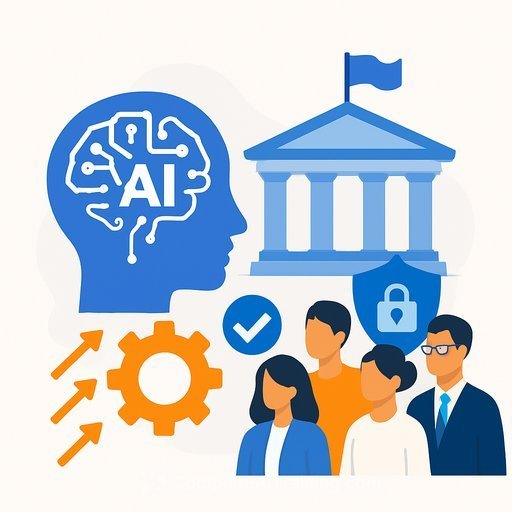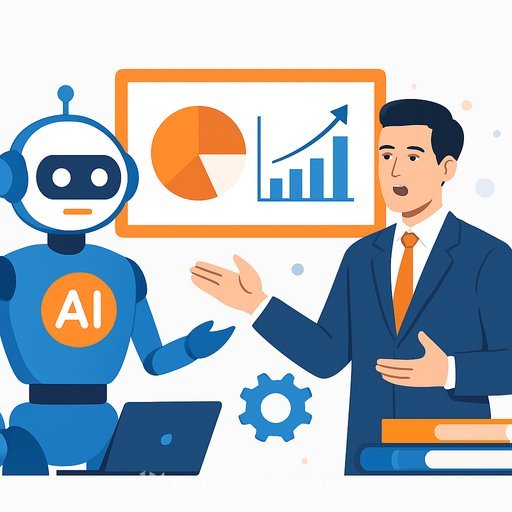HR leads Canada in AI adoption - but job security fears and training gaps persist
HR is ahead of every sector in Canada on AI use. Eighty-one percent of HR professionals report using AI at work. Yet most HR teams are still learning on the fly, and many worry what that means for their careers.
A new survey from Growclass and Angus Reid shows strong adoption, weak training, and rising anxiety across the workforce. The sample included 1,012 adult Canadians.
HR is both leading and uneasy
- Adoption: 81% of HR professionals use AI at work - the highest of any sector.
- Training: 33% of HR have received formal AI training - also the highest, but still low.
- Anxiety: 62% of HR fear AI could replace their role within five years.
- Confidence: Among Canadians who use AI, only 33% feel confident using it effectively.
- Gender gap: 29% of women worry about AI-related job loss vs. 22% of men. Confidence sits at 30% for women and 36% for men.
Where other sectors stand
Digital technology pros are the most confident in their AI skills (56%), followed by non-profit (40%), and government and communications/marketing (38% each). Finance, communications/marketing/advertising, and non-profit also report higher-than-average use.
Healthcare (29%), retail (25%), and manufacturing (31%) lag, often due to internal policies or refusal to use AI.
The training mandate is clear
Forty-two percent of Canadians already use AI at work, but only 12% have formal training. There is strong appetite to upskill: 68% would take AI training if their employer offered it.
Who should lead? Forty-six percent say employers, 20% say individuals, while just 7% point to education systems and 4% to government.
Why employees hold back
- Lack of trust or perceived bias in results: 68%
- Concerns about decreased critical thinking: 67%
- Ethical or privacy issues: 61%
- Cost of tools: 13%
"AI is already central to how we work, but without proper training, it risks leaving people behind, particularly for women and underrepresented communities," says Sarah Stockdale, CEO and founder of Growclass.
Action plan for HR leaders
- Audit usage and ROI: Map current AI use across recruiting, job descriptions, policy drafting, analytics, and L&D. Set clear metrics for quality, speed, and cost.
- Roll out role-based training: Start with fundamentals, prompt quality, and data safety. Pair short lessons with live office hours and practical labs. Use beginner-to-advanced tracks.
- Set policy and guardrails: Define approved tools, PII handling, data retention, and human-in-the-loop checks. Add bias reviews for hiring and performance workflows. See guidance from the Office of the Privacy Commissioner of Canada here.
- Pilot, then scale: Run 60-90 day pilots with small cohorts. Choose vendors with strong security and clear data policies. Track accuracy, time saved, and employee sentiment.
- Address job anxiety directly: Publish role impact maps that show what changes, what doesn't, and how people can grow. Prioritize reskilling for women and underrepresented groups.
- Clarify ownership: HR Ops leads enablement; IT and Legal co-own governance; business leaders commit budgets and adoption targets. Report progress monthly.
What Canadians expect from employers
Employees are willing to learn if the path is clear and credible. Most expect training at work and want proof that privacy, ethics, and fairness are baked into the plan.
The report's warning is blunt: without stronger AI literacy, training, and trust building, Canada - and its most vulnerable populations - will fall behind in global competitiveness. Survey by Growclass and the Angus Reid Institute details.
Helpful resources to close the skills gap
- AI courses by job function for structured, role-based upskilling programs.
- Popular AI certifications to validate skills and build confidence.
- Popular AI tools to evaluate and standardize your stack.
HR already sits in the lead car. The risk isn't AI - it's being unprepared. Invest in literacy, build trust, and make training a habit.
Your membership also unlocks:






